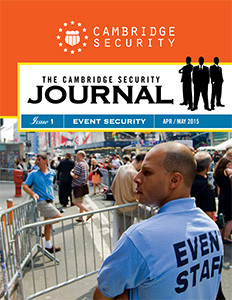 No matter what the event, those in charge of security have to plan for the worst–everything from a riot to a terrorist attack–while preparing for the ordinary and routine: traffic jams, pickpockets, lost items, angry shoppers, and rowdy fans. All without infringing on anyone’s rights, interfering with anyone’s enjoyment or in any way impinging on the commercial success of the event itself.
No matter what the event, those in charge of security have to plan for the worst–everything from a riot to a terrorist attack–while preparing for the ordinary and routine: traffic jams, pickpockets, lost items, angry shoppers, and rowdy fans. All without infringing on anyone’s rights, interfering with anyone’s enjoyment or in any way impinging on the commercial success of the event itself.
To accomplish all this, numerous groups—which may include federal, state and local law enforcement, private security companies, and event employees and volunteers—have to quickly coalesce into a single effective team, with everyone in position and ready for action as the event begins.
To help local law enforcement prepare to meet this challenge, the U.S. Department of Justice prepared a 128-page report that begins by quoting Mark Twain: “The secret of getting ahead is getting started. The secret of getting started is breaking your complex overwhelming tasks into small manageable tasks, and then starting on the first one.”
The DOJ report focuses primarily on huge events of national significance. But, at its core, are six essential functions that are common to virtually all events.
1. Assessing risks and developing a plan
The FBI uses a simple formula to define risk: Risk = Consequences x Likelihood
Some threats, such as tornadoes or terrorist attacks, are very unlikely but would be devastating if they were to occur. Others are common and of little significance—overly boisterous fans at a hockey game, say. Most fall somewhere in between. A “Threat and Risk Assessment” ranks all possible threats using three criteria: the potential harm an incident could cause (to people, property, business and/or reputation), the likelihood of it happening, and the cost of preventing the threat and/or minimizing its impact.
Each event must be evaluated on its own terms. How big is it and how long will it last? Who will be attending? Where is it being held? Will there be any high-profile VIPs? Will there be a significant media presence? What’s the security budget?
Once the threats have been fully assessed, a security plan is developed that specifies what has to happen, when, and what kinds of personnel are needed where.
2. Building the security team
Large, complex events almost always require a police presence, and may involve federal or state law enforcement. Emergency medical services (EMS) are also a regular part of event security. Private security companies supplement the police and EMS, and for smaller events may take the lead role.
Charles Trucillo, a security specialist for Cambridge Security with more than 25 years of police experience, explains that the police don’t always have enough manpower available for an event, and clients don’t always have the budget to use police in all areas. There’s another important factor to consider. Private security officers “can be a little more approachable than the police, who as authority figures can be intimidating to the public,” says Trucillo. “For a multitude of reasons, a blend of the two is usually the best combination for a large event.”
In all cases, especially large events [such as with our client Rutgers University’s home football games, where police, Cambridge Security personnel, and campus security work together], it’s critical to ensure good communication and coordination among everyone involved. That’s the task of those in the command booth, where officers from the various units remain in constant communication with their personnel throughout the event. If a situation starts to escalate, security can quickly let the police officer in the booth know that law enforcement is needed on the scene.
Proper screening and training of all those involved are essential. Private security forces at Rutgers, for example, have been tested for drugs, had their backgrounds checked, and received special training by New Jersey State Police. And all security personnel are briefed on ground rules and any special circumstances surrounding the event.
3. Controlling access
One of the primary functions of event security is controlling who is allowed to go where. At large events, outer, middle and inner perimeters are established, providing ever-tighter rings of security. Even at modest events, such as trade shows, credentials are often used so that security personnel know whether or not an individual has permission to enter a given location.
Certain items may also be prohibited from some areas. While everyone is now used to the strict limits on restricted items at airports, many are surprised when they encounter similar vigilance at sporting events. The NFL recently adopted a policy that limits the size and type of bags that may be brought into stadiums, and many non-NFL stadiums are following their lead. At virtually every event, what someone carries is likely to affect where that person can go.
The security team is also responsible for safeguarding cash. This means controlling access to areas where cash is collected, guarding those who periodically gather it up from, or dispense it to locations throughout the event and watching over the secure areas where cash is stored.
4. Managing transportation and traffic
The success of an event often hinges on traffic and transportation issues. Trucillo, who helped develop the security plans for Red Bull Arena in Harrison, New Jersey, recalls the challenge of managing traffic flow and parking for the 25,000-seat stadium when it first opened. The stadium is in an urban area, which at the time had little room for parking, he explains, “so we had to be creative about how we would direct cars,” to avoid snarling up traffic and straining fans’ patience.
Managing the flow of people and cars at the end of an event can be even more challenging, since just about everyone leaves at the same time, and not everyone is as fresh or sober as when they arrived.
5. Managing administrative and logistical needs
Operational logistics ensures that all members of the security team have what they need to do their jobs, which can include transportation, parking, food and beverages, access to restrooms and any necessary security equipment. Administrative logistics is devoted to acquiring, purchasing and/or renting all security-related items, maintaining control of inventory and managing all the costs involved.
6. Informing and staying informed
Information is critical to event security. The more people know about the basics—when the event starts and ends, what items are prohibited, where to find parking, etc.—the easier it is for security personnel to maintain order. In addition, everyone from local business owners and residents to those in charge of public transportation need to be kept up to date on plans for the event.
The security team not only has to ensure that the right people get the right information at the right time, they also have to monitor what information is sent out by promoters and attendees alike. Security can adjust as needed, provided officers know what’s going on in the social media space. Whether it’s a fan tweeting or a publicist posting on Facebook, it’s important that event security knows if word has gotten out about a surprise celebrity appearance or the types of credentials being used.
 This post was first published as an article in The Cambridge Security Journal, April 2015.
This post was first published as an article in The Cambridge Security Journal, April 2015.
WITH A FOCUS ON EVENT SECURITY, THE FULL ISSUE COVERS:
The Six Basic Functions of Event Security
Cambridge Security Snapshots: Singapore Day in Brooklyn, Super Bowl Boulevard, Loehmann’s Grab the Gown
Interview: Behind the Scenes at a Major Golf Tournament
Drawing on 30 years of experience, Cambridge Security provides event security services, including professional event security personnel, consultation, and celebrity protection for large-scale events such as trade shows, concerts, outdoor festivals, and sporting events; and for smaller-scale gatherings such as shareholder meetings and conferences. Focusing on controlled entry, security searches, crowd management, ushers and theft prevention, Cambridge Security analyzes each engagement and provides specialized service ensuring your event remains orderly, safe, and free of crime.
For more information, please visit our event security services page, or contact our business development team at 1-866-645-1682.


